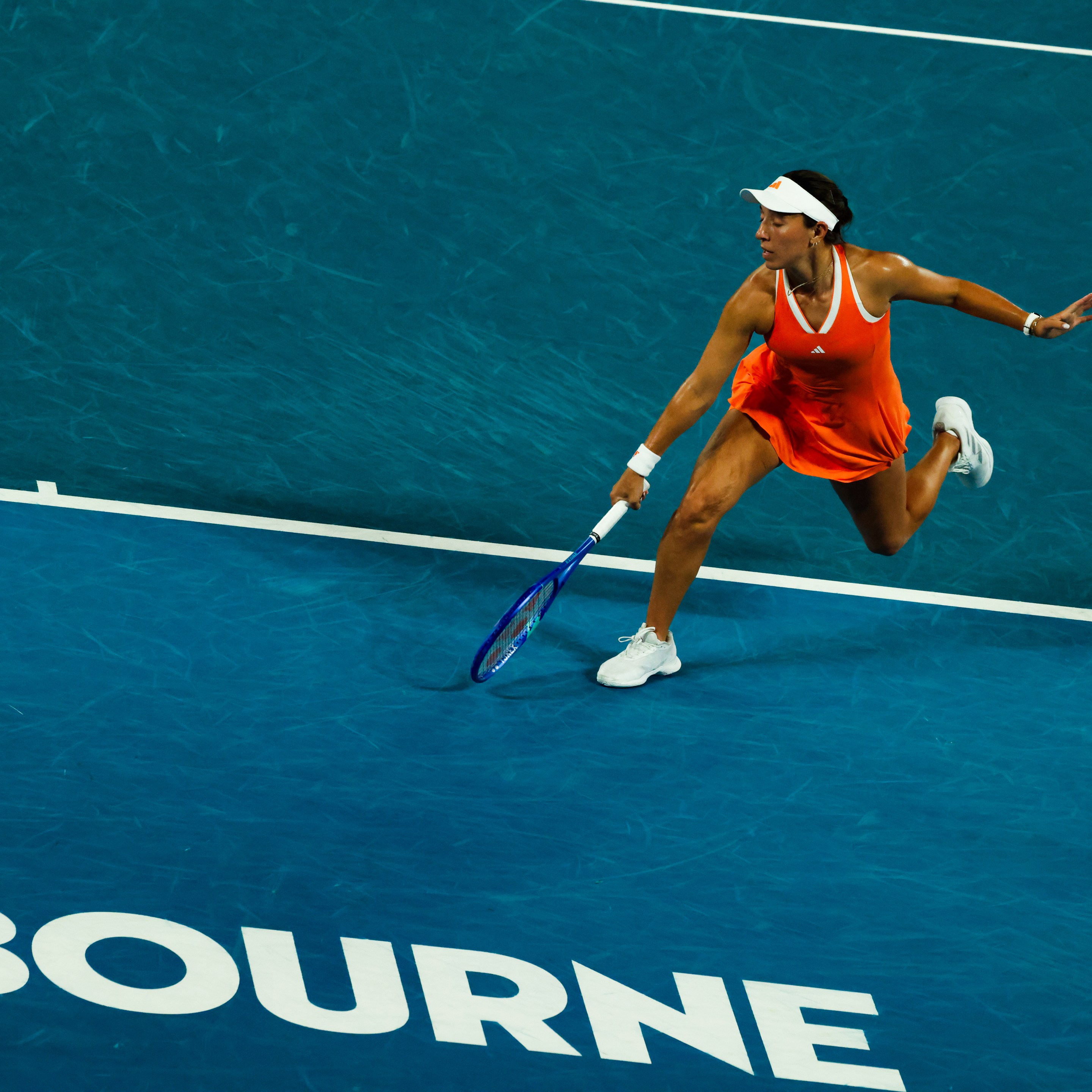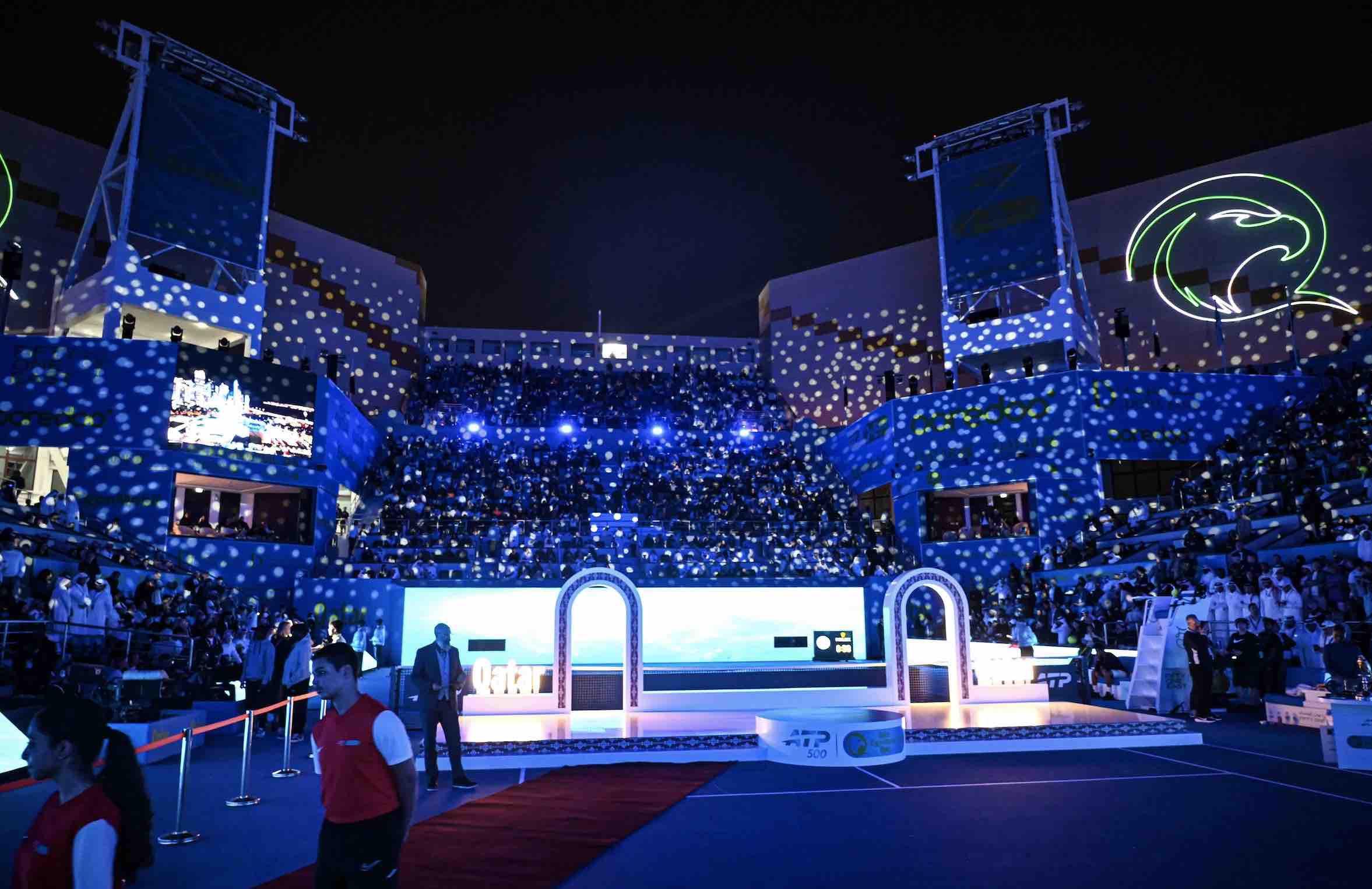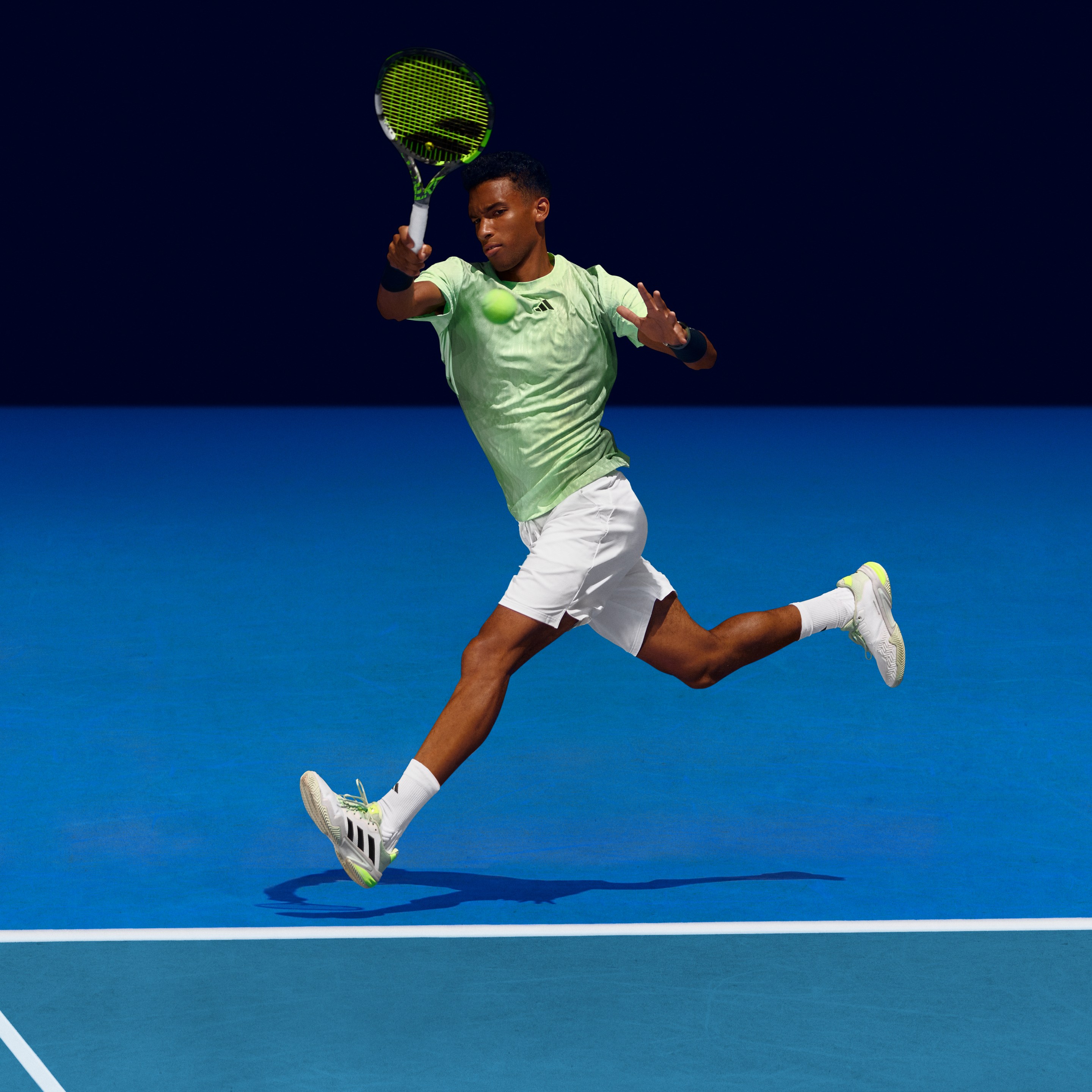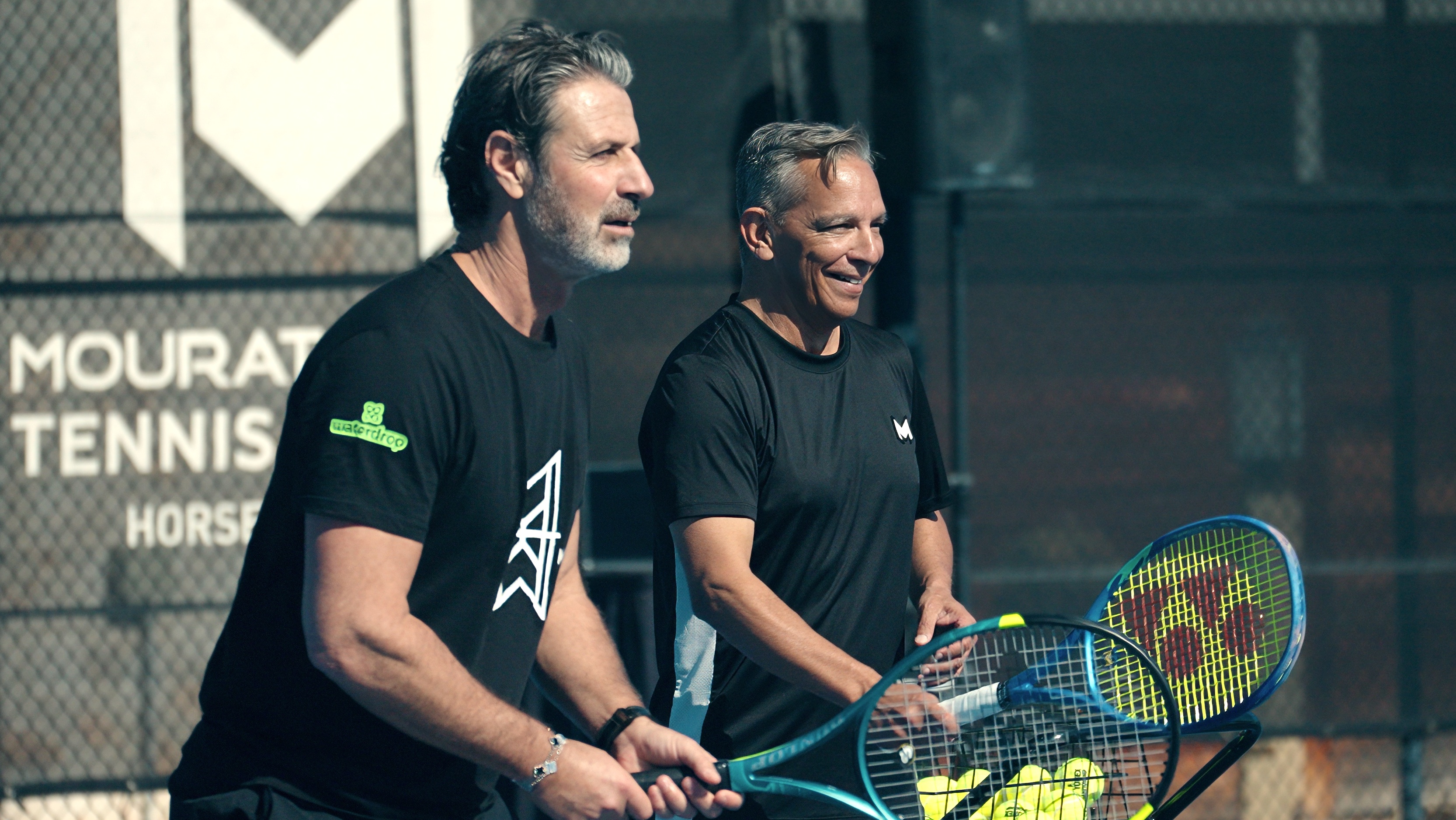The play takes place during the course of a single tennis match, and over the course of two years. The tennis court may be present, or suggested. It never goes away. Other spaces that may be formed include a dining table for a home-cooked meal, a bar, a sidewalk café, a doughnut shop.
Kate and Leslie, in their thirties, will communicate directly with the audience, and also participate in scenes with each other and with Brian, forty, and Russ, in his late thirties1. For the bulk of the play the two men will not
acknowledge or address the audience. They will exist in their tennis world, and also in other spaces conjured by Kate and Leslie.
- The Investigation
Leslie and Kate walk on stage. They are dressed well, as if for work. They address each other, and the audience.
The casting of these roles should reflect the diversity of New York City.
Kate: So….
Leslie: So.
Kate: So we’re going to get inside this event.
Leslie: An examination.
Kate: A post-mortem, if you will.
Leslie: And maybe along the way we’ll make some kind of discoveries. About boy-
friends. Or husbands.
Kate: Or men in general.
Leslie: Whatever it is that makes them tick.
Kate: We have many questions.
Leslie: What are those secret spaces? Those inside parts that they show to each
other. Or to no one.
Kate: The deep wells of pathos…
Leslie: Or is it rage? Or fear?
Kate: The deep wells that drive men forward to the office, to the track, to the fields of war, to the fields of sport.
Leslie: Perhaps mothers with sons understand more, having seen their babies grow
and stretch, having seen them get socialized, contorting their way into the small spiked box that is civilization. (She notices Kate looking at her.) Too much?
Kate: Kinda. (outward) We are not mothers with sons. But still, we will try. Leslie For our own sakes, as much as theirs.
Kate: Though there may well be less there than meets the eye. Less profundity, less imagination.
Leslie: More limitations.
Kate: Though we’re all limited, in our ways.
Leslie: A single, solitary tennis match. That’s what we’re talking about.
Kate: Their last match. The day that their friendship, or whatever it was, came to an ignominious end.
Leslie: Not my game.
Kate: Nor mine. My father, he played, back when I was a child. The phone would ring for him. “Hey –Bob there?”, they’d say. And we knew it was a tennis friend. They’d pull up in their cars, and give a honk, “a bunch of savages”, my mother said –rarely if ever did they come in the house. They’d head off for hours. They’d take my father away.
The set, designed by Amy Rubin.
Brian emerges, with his tennis bag, with his tennis gear. He is wearing sweats. He starts getting ready for the match, unpacking his bag, laying out a towel, and various snacks, taking the jacket off, putting on his wristbands, headbands, wrapping grip tape on his racquet handle, engaging in some light stretching, etc.
Leslie: There. That’s Brian. He’s obsessed. At least he was. He plays, or rather he
used to play, all the time. Back then he was a little thinner. (She takes another look at him.) Ridiculous, huh? Or cute? I never could make up my mind.
Russ enters the playing area, with his tennis bag, and gear. He’s wearing old shorts and a sleeveless shirt. He gives Brian a brief nod, then starts laying out his stuff.
Kate: That’s Russ. He’s clean shaven now, though at the time he had a moustache. A work thing. Back then, he was trying to break into commercials, and the moustache was supposed to help. He was waiting tables too, had a couple of lunch shifts at this barely mediocre Italian place in the West Village.
Leslie: We had done well in our way. They were both handsome fellows, and rela-
tively capable.
Kate: Tightly-wound sure, but that’s New York for you.
Brian turns to Russ and screams at him.
Brian: Don’t you fucking say a word! Russ What? What?
They advance toward each other. The women clear their throats. The men retreat, and get back to preparing for the match.
Leslie: Where were we?
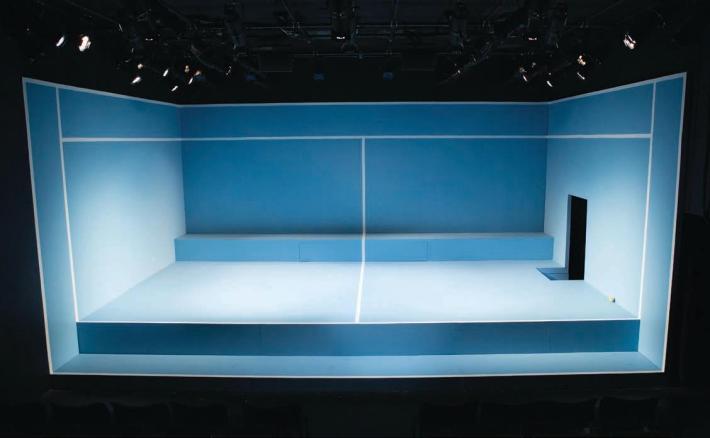
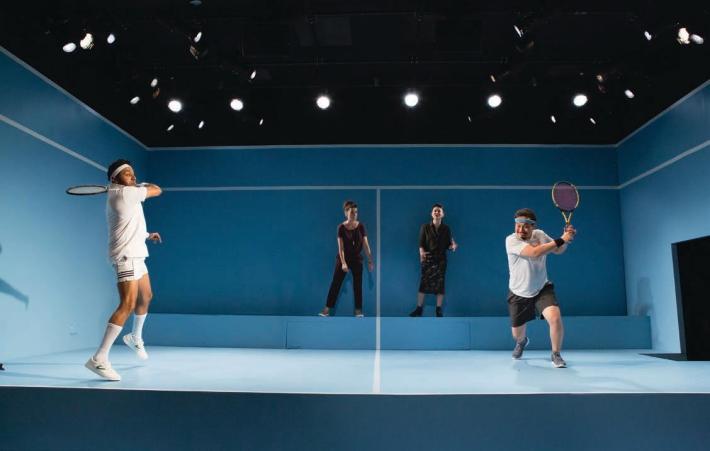
Hunter Canning
Kate: We are in New York City. Downtown Manhattan. At the Brian Watkins Tennis Center — 12 crumbling concrete courts. To the west is the FDR Drive, the cars zooming by at all hours. You enter the courts from the north. Further up that way: baseball fields, and soccer fields; A quarter mile track, busy from dawn onward.
Leslie: To the east, the promenade, finally repaired after fifteen years, sprinklers
watering the new planted native flora. In the old days, not so long ago, no one wanted to walk over there. But it’s nice now. Civilized.
Kate: Meaning gentrified?
Leslie: If you wish.
Kate: … Their last match. It’s a September day, not especially hot….
Leslie: Seventies maybe – that’s what’s expected.
Kate: …But fucking humid.
Leslie: Sunny and sticky, the kind of day that can put a person in a truly foul mood. Kate A weekday – just past 7am.
Leslie: Brian gets there first. He’s come a little early to work on his serve, to see
if he can’t get it in a good rhythm before the match. He’d woken up without the alarm, 6:15, had left the bedroom, and gotten changed in the living room. He’d laid his clothes out the night before.
Brian: at this point starts stripping off his sweats. He is dressed in tennis whites.
Kate: White shorts, white socks, white shirt.
Leslie: I gave him the shirt. A birthday present, which he’d requested.
Kate: White wristbands. White headband.
Leslie: He’d ground his coffee too, the night before, didn’t want to wake me up. Kate: Okay, wait, stop. Hold on a second. Before we go on, someone should ask,
I mean I hear the question in the air. What is the point? What exactly are we watching here? Two grown men in shorts, one of them dressed for Wimbledon?
Leslie: Tennis is life, the bumpers stickers say. Bull shit. Tennis is not life any more
than golf is, or football, or hockey or dog breeding or literature. Life is life. That’s all – nothing else.
Kate: And yet, something happened that day. Something minor in the grand scheme of this cruel world full of wars and starvation, droughts, storms and melting glaciers. Minor, but real nevertheless, in its way.
Leslie: Something ended.
Kate: A small incident which changed these men, and their families and their futures. Or maybe not. Maybe we all just go on, as the same kind of shitheads, the same kind of fools.
Leslie: Flashback 17 months earlier: It’s mid-spring, early evening, and Brian and
I are walking home along lower Second Avenue. It’s a warm night, one of the first of the season, and people are out and about. Brian’s got his tennis racquet with him. He has just had it restrung. (To Brian) I don’t know about you, but I’m half-starved.
Kate: Leslie? Leslie Warrick? (To the audience) I’m sitting at an outdoor café with Russ, drinking a Guinness. I’ve come from work, high heels, pencil skirt. I look good. (To Leslie, as if we’ve jumped back, briefly, in time.) Leslie? Leslie Warrick? Kate.
Leslie: Kate? Kate! It’s been years. How did you-?
Kate: That voice of yours, I’d know it anywhere.
Leslie: Last I heard, you were in Chicago.
Kate: St. Louis, actually. But now we’re in Williamsburg. This is Russ.
Leslie: And this is Brian. (To Brian) Kate and I went to college together.
Kate: It has been years.
Leslie: I may sound the same, but you, you actually look the same.
Kate: Hah.
Leslie: No, seriously…
Kate: And soon enough they start sniffing each other out.
Russ: Wilson Pro Staff?
Brian: Original model. St. Vincent.
Russ: Sampras-style.
Brian: Edberg, man. All the way back.
Brian hands Russ the racquet.
Russ: Nice balance.
Brian: I mean, I’m just a hacker really, 3.5, 4.0 on a good day.
Russ: Sounds about right.
Brian: So…
Russ: So…
Leslie: So nice to run into you!
Kate: You too. Let’s have dinner sometime.
Leslie: Sounds like a plan.
Kate: A double date. Or if you want, we could just meet for yoga. You like yoga, right? (To audience.) I look her up and down, to see how the years have treated her. (To Leslie) Here’s my card. (She hands her a card.) I gave her my business card.
Leslie: Thank you.
Kate: And Leslie and Brian went on their way.
Leslie: (Looking at the card) Did you see how she looked me up and down? What a weirdo.
Brian: She seemed all right. Was happy to see you again.
Leslie: She’s probably desperate for friends. It would serve her right – she was a
total snob in college.
Brian: (Reaching for the card) May I?
Leslie: He reached for the card in my hand. (To Brian) Why?
Brian …
Leslie: Oh. Right. Do you really have time for more tennis?
Brian: If he’s any good.
Kate: Out in Williamsburg, on that humid September morning, Russ gets up at 6:45. I’m in Chicago on business, so he’s on his own. He spent all afternoon the day before banging balls against the wall, working on his backhand. He came home and pasta loaded, then watched instructional videos on the internet. He’s glad that I’m gone – it is best, he thinks, that I not see him like this. He has lost four matches in a row and is anxious for revenge.
Leslie: There are degrees of obsession that athletes have. You read about it on the professional level. The high oxygen tents, the gluten-free diets, the resistance exercises involving tires or thick rope. There are some who choose to save their seed, view the expulsion of ejaculate as a weakening of male force. Others take the opposite approach.
Russ: That girl– what was her name?
Kate: Which girl?
Russ: The one you went to college with.
Kate: You know, she never wrote me. I suppose it’s no surprise – it’s not like we were friends back then – she was pretty low on the social totem pole. Kind of a weirdo too, probably still is.
Leslie: So Russ found Brian on Facebook. Stalked him you might say.
Kate: And they made a date.
Leslie: A blind one.
Kate: In the olden days, to find a partner, there’d be pickup games. You’d watch players in action, and challenge them to a set.
Leslie Nowadays, in the Craig’s list age, you have what they call the NRTP self-rating system, wherein players classify themselves according to a specific set of criteria. A nice idea, sure, but it doesn’t account for human delusion. There is the person we are, or player in their case.
Kate: Or man.
Leslie: Or man. Along with what one might call the inner player, the one we see in our mind’s eye – that finely tuned athlete with the killer serve, and graceful groundstrokes - this being the player who usually gets rated.
Kate: As it happens, with these two, the delusions match.
Leslie: Brian having the slight groundstroke edge, particularly from the backhand. Kate: Mobility to Russ. And net play, those years as a street hockey goalie paying off.
Leslie: Fitness to Russ, usually, at least until Brian plays himself into shape.
Kate: Serve favoring Brian, who sometimes finds zip.
Leslie: Based on physical ability, and skill, it was hard to separate them. And so it came down, as it so often does, to the space between the ears. Tennis being primarily a mental game. A game of focus.
Kate: To put everything else outside.
Leslie: To not hate yourself after a mistake.
Kate To not get too high, too low.
Leslie: We Americans read so much into winning.
Kate: It’s character. It’s will. It’s that little extra something. Or is it luck or chance? Fate?
Leslie Everyone likes to win. Men in particular.
Kate: And when they don’t…
Leslie: …it can become a much bigger deal than it should.
Russ: Goddamnit! (He breathes then manages a forced smile.) Nice shot.
Brian: 40-15.
Andy Bragen’s plays and translations include This is My Office (The Play Company), Vengeance Can Wait (Performance Space 122), and Don’t You F**king Say a Word (59e59). For more information:
www.andybragen.com
Featured in Racquet Issue No. 2
